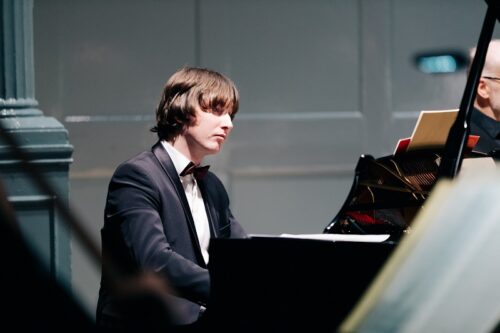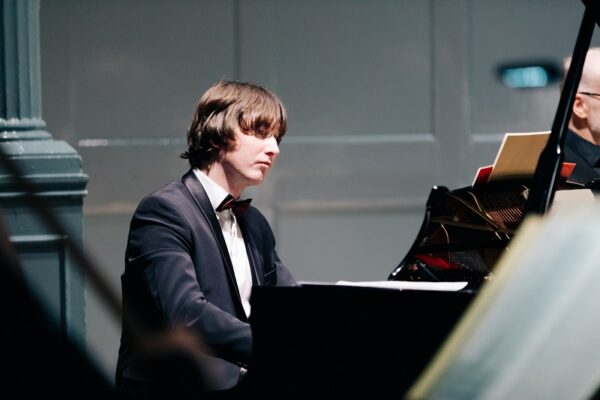 United Kingdom Beethoven, Rossini, Schubert: SCO Chamber Ensemble (Maxim Emelyanychev [fortepiano], Stephanie Gonley [violin], Fiona Winning [viola], Philip Higham [cello], Nikita Naumov [double bass], Maximiliano Martín [clarinet]). Queen’s Hall, Edinburgh, 20.2.2022. (SRT)
United Kingdom Beethoven, Rossini, Schubert: SCO Chamber Ensemble (Maxim Emelyanychev [fortepiano], Stephanie Gonley [violin], Fiona Winning [viola], Philip Higham [cello], Nikita Naumov [double bass], Maximiliano Martín [clarinet]). Queen’s Hall, Edinburgh, 20.2.2022. (SRT)

Beethoven – Trio in B flat for clarinet, cello and piano, Op.11
Rossini – Duo in D for cello and double bass
Schubert – Piano Quintet in A, D667, ‘The Trout’
Chamber music has long been a strand of the Scottish Chamber Orchestra’s season; Sunday afternoon concerts that showcase members of the orchestra in small scale repertoire, giving them a chance to shine in much more intimate music than they will get to play in their regular orchestral concerts. I don’t often go – Sunday afternoons can be tricky – but I have always enjoyed the ones I have been to, and this one was a warming joy on a winter’s afternoon.
It was Maxim Emelyanychev that drew me in. The orchestra’s Principal Conductor is also a whizz at the keyboard, so he is a galvanising presence in more ways than one. He is also a specialist in period performance, so it is no surprise that he took to the fortepiano for this concert. I don’t know the details of the instrument, but its tone was soft, slightly withdrawn, often tinkling gently in its upper register. Ideal for Viennese chamber music, in other words, and this often rubbed off on Emelyanychev’s collaborators. Neither Philip Higham (cello) or Maximiliano Martín (clarinet) were playing period instruments, but Higham used his vibrato noticeably discreetly, and all three of them really listened to one another in Beethoven’s ‘Gassenhauer’ Trio, flirting with the music in a way that showed both respect and affection. It is often said that Beethoven’s choice of theme for the finale elevated what is little more than a popular song, but this trio of musicians seemed even to elevate what can be quite throwaway music from Beethoven. Seriousness and focus were always to the fore, but I loved the sense of humour that shot through the playing, and I enjoyed watching Emelyanychev smile to himself as he enjoyed his own ornamentations on the repeats.
There weren’t that many ‘period’ touches in Schubert’s evergreen Trout Quintet, but this performance was characterised by mutual warmth and love for the music. The four string players were very much equals, playing with lyrical charm, and the choice of instrument meant that the piano never dominated the texture. For beauty and equality, the lovely slow movement sounded best, but the touch of raucousness to the Scherzo, and the energy of the finale, sounded really terrific.
The SCO’s principal double bass, Nikita Naumov, probably contributed most to the colour of the quintet’s sound, digging into the notes and giving a pleasing nutty edge to the tone. I couldn’t quite take him so seriously in Rossini’s D major duo, however; principally because, to me, any music written for solo double bass sounds intrinsically hilarious. It is my problem, I know, but I suspect Rossini may have agreed with me because for most of the piece the bass is reduced to some amiable chugging while the cello gets on with the lyrical melodies. Never mind it’s interesting for novelty value, if nothing else, and the audience loved it.
On that note, how wonderful it was to see the ground floor of the Queen’s Hall (and much of the balcony) packed out with punters for the first time in two years! Let’s hope that’s a sign of things to come. Even more importantly, and just like the audience, the performers demonstrated something you don’t see often enough in chamber music: they looked like they were actually enjoying themselves!
Simon Thompson
